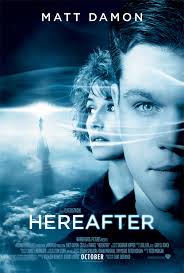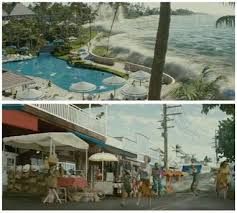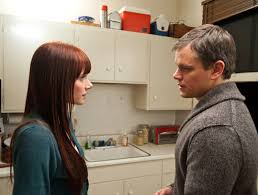Hereafter is a film with very noble intentions. It aims to investigate the afterlife, a entity that none of us really know anything about, except for what we believe it to be. However, a subject this mysterious is sure to be difficult, and though he tries, director Clint Eastwood doesn't quite stick the landing in this unusual departure from his comfort zone.




The film, written by Peter Morgan (The Queen), tells the stories of three people. In San Fransisco, George (Matt Damon) can communicate with the dead, but views this as a curse. He's quit his job as a psychic, and instead now works at a factory, despite his brother's efforts to get him to take up his old profession. In Paris, Marie (Cecile De France) is recovering from a near-death experience from a tsunami while in Indonesia, and decides to take time off from being a hard-hitting journalist to investigate research into life after death. And in London, Marcus (Frankie and George McLaren) is struggling with the death of his twin brother, who was the most important person in his life. Of course, everyone's paths are set to cross, Babel-style, while investigating each character's reaction to the "hereafter."
First things first: the film starts out with an incredible bang. The tsunami scene (yes, the same tsunami from 2004 that devastated Indonesia) is wonderfully staged, despite being the kind of big special-effects sequence that Eastwood has only rarely done. Unlike similar sequences in summer blockbusters, this one is genuinely intense, and properly disorienting without being hard to follow. It's a masterful work that shows that, even at 80, Eastwood still has plenty of surprises up his sleeves.
However, the rest of the film is less than thrilling. Don't get me wrong, there's plenty of interesting things going on here, and it's not necessarily a bad film. But each segment isn't given too much room to breathe, leaving a lot of things unaddressed and a lot of development seemingly coming out of nowhere. Morgan seems a little out of his element here, since he's better known for tackling political stories and injecting them with human drama. The film feels like it would have functioned better as a TV miniseries, where each segment would have had more room to blossom and become something great.
George's segment is the weakest of the three. Damon isn't given much to do other than look contemplative and eat dinner alone. And even though he shares a few great scenes with her, Bryce Dallas Howard's role is completely pointless, as she doesn't really bring anything new to light or even get much of a character to work with. Her Melanie is an obvious plot device, nothing more, but what is she a device for? It's a messy subplot that ultimately goes nowhere. And really, George doesn't become important to the story until the end anyway. It's a waste of Damon's considerable talents (though I wasn't too fond of his last performance in an Eastwood film either).
Marie's segment, of course, gets the thrilling tsunami sequence. But it also receives a little more attention and development than George's as well. Her struggle with the trauma she survived is well-done, and De France's performance is nuanced and touching. Her story also, unlike George's, has real stakes and consequences: as she goes off to pursue her book and take time off, her professional life as a TV journalist falls apart, forcing her to reconcile her choices with what she really want to do. Yet there's still not much here; indeed, it seems that Eastwood's story-focused direction doesn't lend itself well to this, where some discussion about the afterlife and some exploration into people's perceptions of it would be helpful.
By far the most touching segment is Marcus's. Though Eastwood has had a spotty history with child actors, both of the McLarens (who take turns playing Marcus and his brother, Jason) deliver fine work. It also doesn't hurt that the death of a child always gets to me; it's one of those things that always gets me emotional. This segment also has the most meaningful payoff, with a clear course from beginning to end with no real hiccups along the way. It's the best of the three stories, and the one that would have made a great movie had it been the only one.
The biggest problem with Hereafter is that there are no grand consequences or effects from the three stories. Everything gets wrapped up a bit too tidy, and, without spoiling it, the final scene is incredibly out-of-place and really brings the film down with it. Death is a messy part of life, and it has a profound effect on everyone. Unfortunately, Hereafter never finds that same profundity, saying very little about the afterlife or why it even matters. It's a decent film that's never too concerned with it's subject matter.
Comments